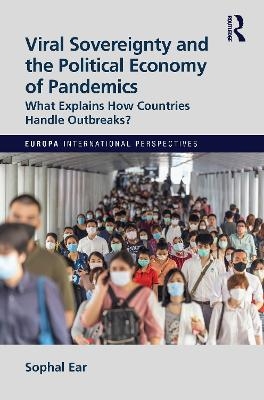
Viral Sovereignty and the Political Economy of Pandemics
Routledge (Verlag)
978-1-032-13385-0 (ISBN)
Over the past few decades a number of emerging infectious diseases (EIDs) have disrupted societies throughout the world, including HIV, Ebola, H5N1 (or ‘‘avian flu’’) and SARS, and of course the coronavirus disease (COVID-19) which spread worldwide to become a global pandemic. As well as EIDs, countries and regions also contend with endemic diseases, such as malaria. There are many factors that have contributed to the rise in, and spread of, EIDs and other diseases, including overpopulation, rapid urbanization, environmental degradation, and antibiotic resistance. Political and cultural responses to disease can greatly affect their spread. The global community needs to defend itself against disease threats: one weak link is enough to start a chain reaction that results in a global pandemic such as COVID-19. Some states take a nationalistic approach towards combating disease; however, international cooperation and meaningful ‘‘viral sovereignty’’—empowering countries to create effective health institutions and surveillance systems in order to contain disease—must be considered.
This volume, with a focus on Southeast Asia, Africa and North America, considers the intersection between disease, politics, science, and culture in the global battle against pandemics, making use of case studies and interviews to examine the ways in which governments and regions handle outbreaks and pandemics.
Dr Sophal Ear is Associate Dean for Undergraduate Programs and Global Development and a tenured Associate Professor in the Thunderbird School of Global Management at Arizona State University, USA. He is the author of Aid Dependence in Cambodia: How Foreign Assistance Undermines Democracy (Columbia University Press), co-author of The Hungry Dragon: How China’s Resource Quest Is Reshaping the World (Routledge), and co-editor of the special virtual issue of Politics and the Life Sciences on Coronavirus: Politics, Economics, and Pandemics (Cambridge University Press). A graduate of the University of California, Berkeley, and Princeton University, he moved to the United States from France as a Cambodian refugee at the age of 10.
Introduction
1 Cambodia, Indonesia and the US Naval Area Medical Research Unit 2
2 Thailand: Challenges with EID Surveillance in a Regional Leader
3 Managing Artemisinin-Resistant Malaria in the Greater Mekong Subregion
4 The West African Ebola Virus Epidemic of 2014
5 Kenya: Diagnostics versus Research in an East African Community Leader
6 Infectious Disease Surveillance on the US-Mexico Border
7 Transparency and Cooperation in Mexico’s Swine Flu Outbreak
Conclusion
Bibliography
| Erscheinungsdatum | 30.11.2021 |
|---|---|
| Reihe/Serie | Europa International Perspectives |
| Zusatzinfo | 12 Tables, black and white; 7 Halftones, black and white; 7 Illustrations, black and white |
| Verlagsort | London |
| Sprache | englisch |
| Maße | 156 x 234 mm |
| Gewicht | 453 g |
| Themenwelt | Sozialwissenschaften ► Politik / Verwaltung |
| Wirtschaft ► Volkswirtschaftslehre ► Wirtschaftspolitik | |
| ISBN-10 | 1-032-13385-6 / 1032133856 |
| ISBN-13 | 978-1-032-13385-0 / 9781032133850 |
| Zustand | Neuware |
| Haben Sie eine Frage zum Produkt? |
aus dem Bereich


